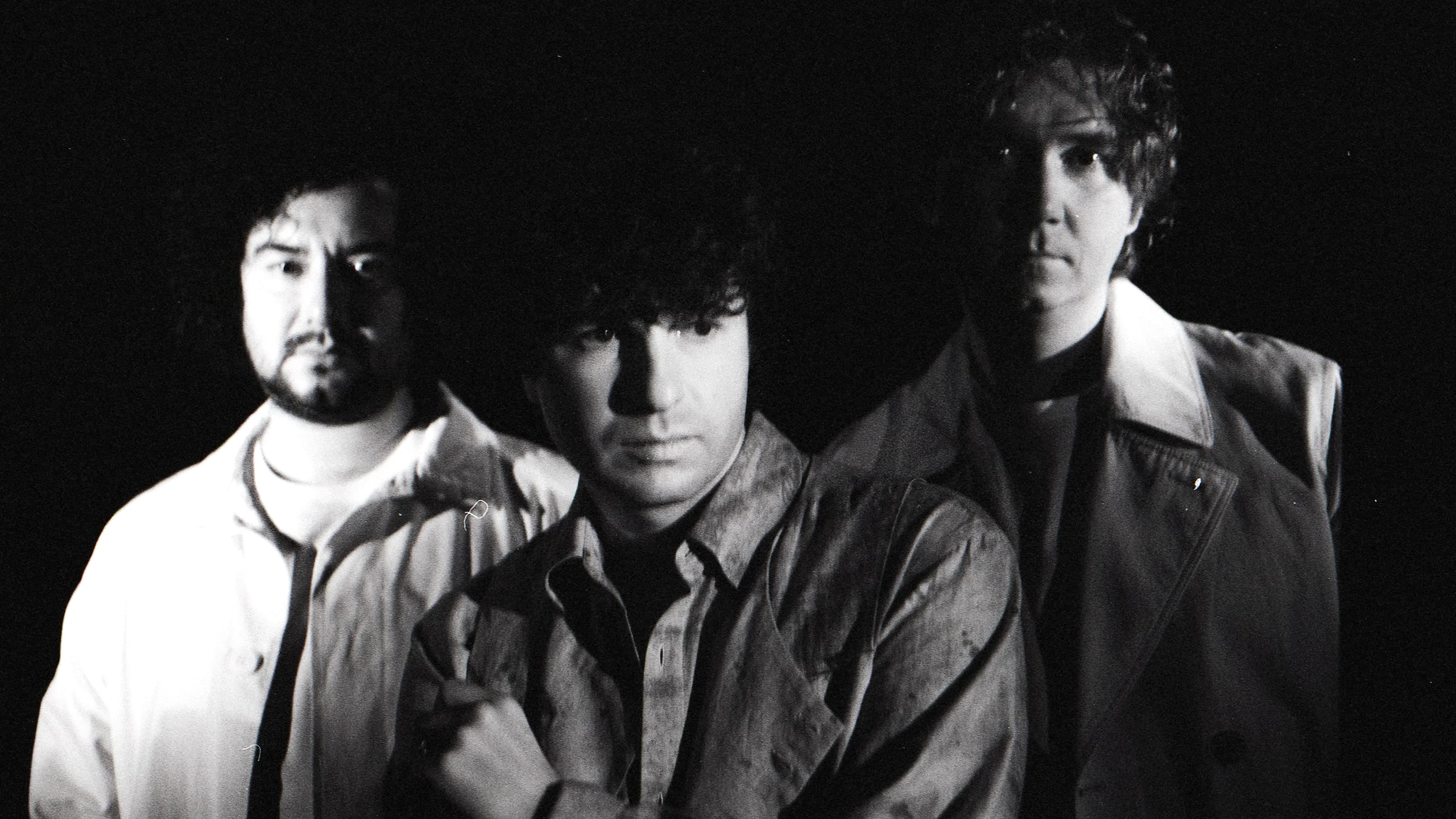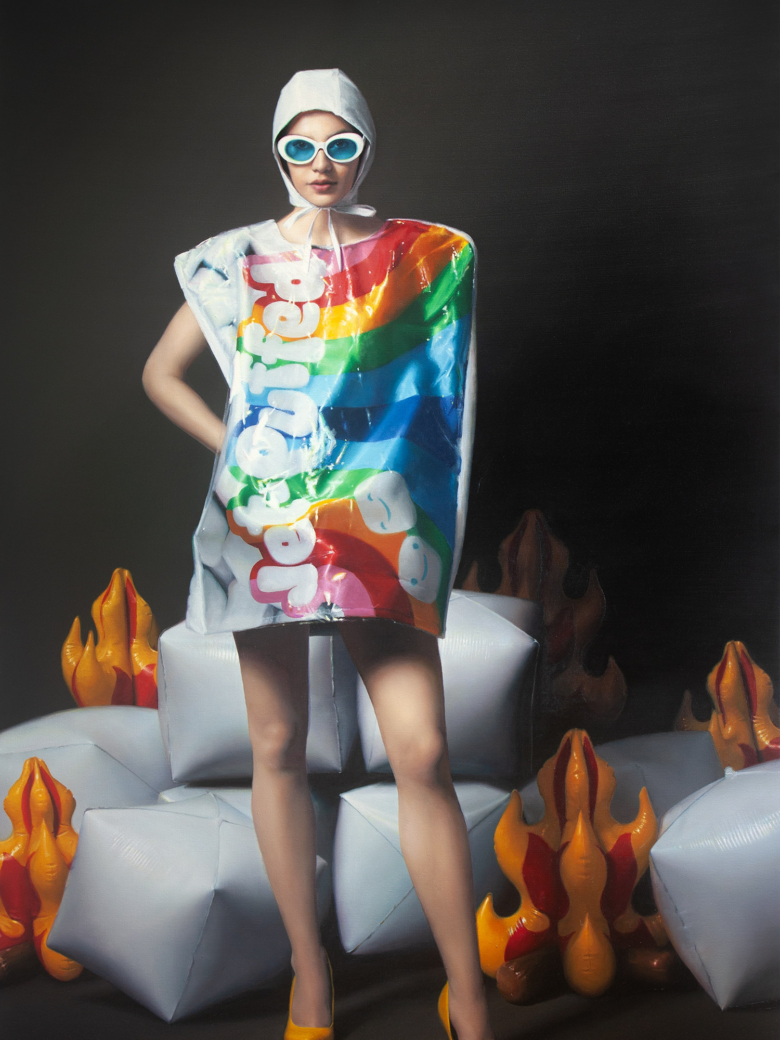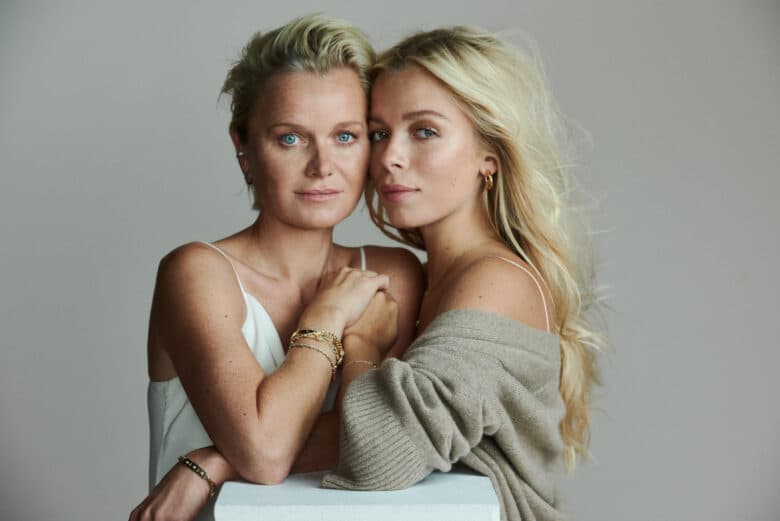“You don’t think about how what you’re doing at the moment is forming a big picture. But it’s through getting older that you see how things have crystallised into an era,” Luke Prichard, the frontman of The Kooks, tells me one day after his 37th birthday. The Kooks are a band that is largely defined by a time that they, in part, helped usher in; an era that is now known as indie sleaze, and is having quite the revival. It’s an easy time to romanticise as we step into an increasingly technological future, defined as it is by the walk of shame, smudged eyeliner, ripped tights, Marlboro Reds, and a revolving cast of party girls — think Kate Moss, Alexa Chung and their various indie-rocker boyfriends. “It was very debauched, wasn’t it,” Luke laughs. “That’s the thing about indie sleaze, it was no sleep till Brooklyn”.
Formed in 2004, The Kooks, with their slew of end-of-the-night anthems, provided an enduring soundtrack to that era, and for many of our formative teenage years. But for a band that has been defined by a handful of great songs (‘She Moves In Her Own Way’, ‘Naive’, ‘Seaside’), it’s only natural to question where they can go from here, and whether they will ever be able to extricate themselves from their early success. Guitarist, Hugh Harris, who was only 15 when The Kooks were signed, admits that he pretty much has the band in his DNA at this point. “This is not a one-hit-wonder project, and sometimes it feels like it is. And then sometimes it does feel like a one-hit-wonder project but with lots of one-hit wonders in the project,” he reflects, citing a period where there were “awkward festivals and awkward gigs and some awkward responses from all corners of the music industry.”
In February, I attended the final show of their delayed 15th-anniversary tour for their debut album, Inside In/Inside Out, at the Brixton Academy. Sold out, and packed with screaming Millenials and Gen Z’ers alike, the energy was undeniably electric as they played songs that we have sung for decades, their lyrics firmly ingrained from puberty. The band’s relevance isn’t so much a question when you consider the effect they have, whether you’re listening alone, at a bar at closing time, or attending one of their gigs. The Kooks, unlike so many other indie bands of the era, have survived, and now, 18 years since forming, are officially of age.
It’s something that is evident in each of the band members. Despite previous concerns about their posterity, they’re now at a place where the pressure has eased off, and are “proud and cool with it all”. They have a new album, 10 Tracks To Echo in the Dark, which will be released in July, and after many self confessed tumultuous relationships, Luke is married and has a three-month-year-old son, Julian. His favourite Kooks song? ‘Jackie Big Tits’, of course. Finally, drummer Alexis Nunez, who joined the lineup in 2012, is exploring songwriting, after penning his first track for the band. “We’ve all settled into a state of zen,” he tells me. The Kooks, in short, are all grown up.
Here, HUNGER speaks to the band about their wild past, nostalgia, the future — and why they’re most definitely not a landfill indie band.
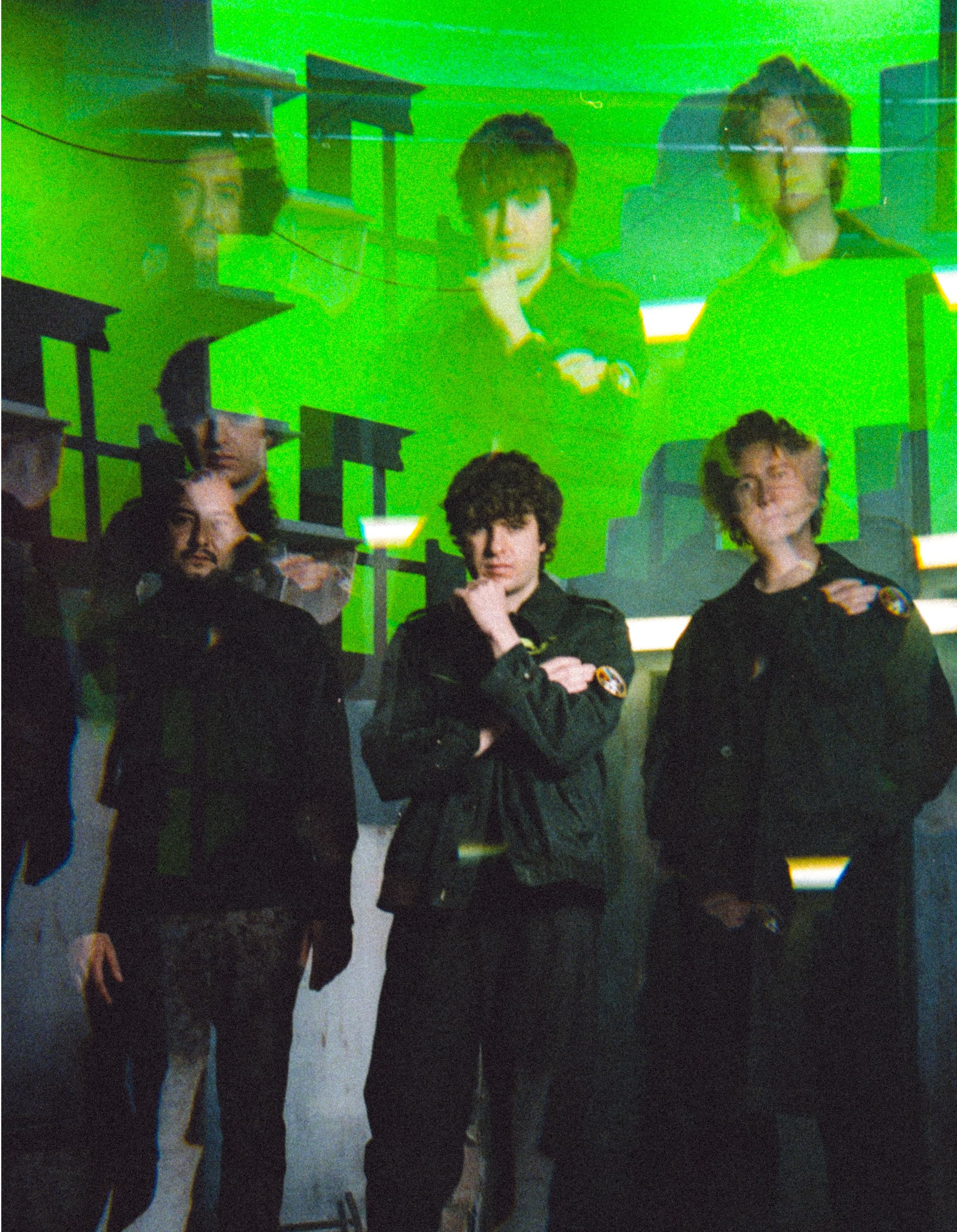
Nessa: 10 Tracks To Echo In The Dark is your first big album since Let’s Go Sunshine, which came out in 2018. Why is now the right time for this album?
Luke: It’s the right time because we’ve had a lot of it in the bag for a long while. It should have come out a long time ago. The theme and feeling of the whole album is quite euphoric, and it was about trying to find hope in the madness that was going on, and being a bit imaginative because we didn’t have many human experiences during the pandemic. The euphoria that came out of the writing surprised me the most because it was pure escapism, I guess, and I wanted to bring that into my life when I was stuck in a tiny room. I mean, most of it was made in this tiny room that I’m in now.
Nessa: For you Luke, it’s the first album you’ve made since getting married and becoming a father. Pretty big stakes.
Luke: Yeah, huge. I think where the euphoria comes from is just finding your feet a bit. Being happy is quite a rarity for me [laughs]. I’ve had quite tumultuous relationships in the past and stuff, so it’s definitely been super influential in my writing. ‘Connection’ is about the night I met Ellie, and ‘Beautiful World’ is about when I found out that Julian was coming. The overriding thing, especially with having a kid is that you give up some of the old niggles in your brain. It’s about the next generation and letting go of your ego a bit, and being positive essentially. I hope that comes across.
Alexis: I think that’s really true. The band has been together for a while now, and we all feel quite secure. It’s just about the pursuit of happiness now as human beings. But when there’s family involved, as there is now, there are so many new places to get inspiration from, not just relationships. That all seeps into the music, and it definitely feels like these songs have real optimism.
Hugh: Us as a family is reflected in the record too, as well as Luke’s new family. There’s a brotherhood that comes across on the new album. We’ve been playing music together, the three of us, for a huge amount of time now. It’s fucking huge. Solidifying that during the pandemic has been powerful — you’re distant and you’re kinda connecting via satellite sometimes.
Luke: 100%
Nessa: We’ve seen a lot of new trends emerge post-lockdown, like indie sleaze. What did you guys think when it first started trending? I mean, there are 14/15-year-olds listening to albums of yours that were released 10 years ago…
Alexis: I think it’s quite encouraging because looking back there were a lot of independent labels and a lot of good music. Even though we were a lot younger and maybe more ego-centric, there was so much great stuff happening. It’s nice that people feel a connection with that.
Luke: How is it vintage though? How is it vintage? That’s crazy. It’s mad.
Hugh: Well, it’s like things will never be made in that way again because we have computers. The first two records we did, we’d go over a song in a room with four or five people running it from top to bottom 10 or 20 times. You just have one person on a computer doing that these days. It’s the magnitude of having four hearts just kind of connecting together on one song — it just enriches the arrangement and the melody and it’s a stronger piece by the end. Music will never be made that way anymore. It would be quite cool if you had a band that came out now and said, look, we haven’t used any computers and we’ve just been rehearsing in a room for six months. That would be a novelty. I think that’s why the curtain has been pulled on that era. By proxy of not having a smartphone, people were more present and connected back then. That’s why a lot of Gen Z revere the nineties and noughties, there was a true presence amongst artists and performers.
Luke: It was very debauched though, wasn’t it? That’s the big generational shift I’ve seen, it’s not as debauched as it used to be. And that’s the thing about indie sleaze, it was no sleep till Brooklyn. It was all day and night. A lot of great music comes out of that. In the indie days, it did get a bit out of control and I think it’s cool to look back on now. It’s wild, at the time you don’t think about how what you’re doing is forming a big picture, do you? But it’s through getting older that you see how things have crystallised into an era. I definitely look back fondly, but it was crazy, it was intense.
Hugh: It was punk. At the time, it didn’t feel like we were touching punk at all compared to now comparatively, especially post-pandemic. There’s more accountability at gigs now because if you do something crazy, someone will film you.
Luke: It stifles people’s creativity as well because you’re aware of that. But well, we can’t hate on the future, and our new album has the indie sleaze DNA but run through a Ferarri.
Hugh: It’s got a foot in the past for sure, but it’s also got a foot in the now.
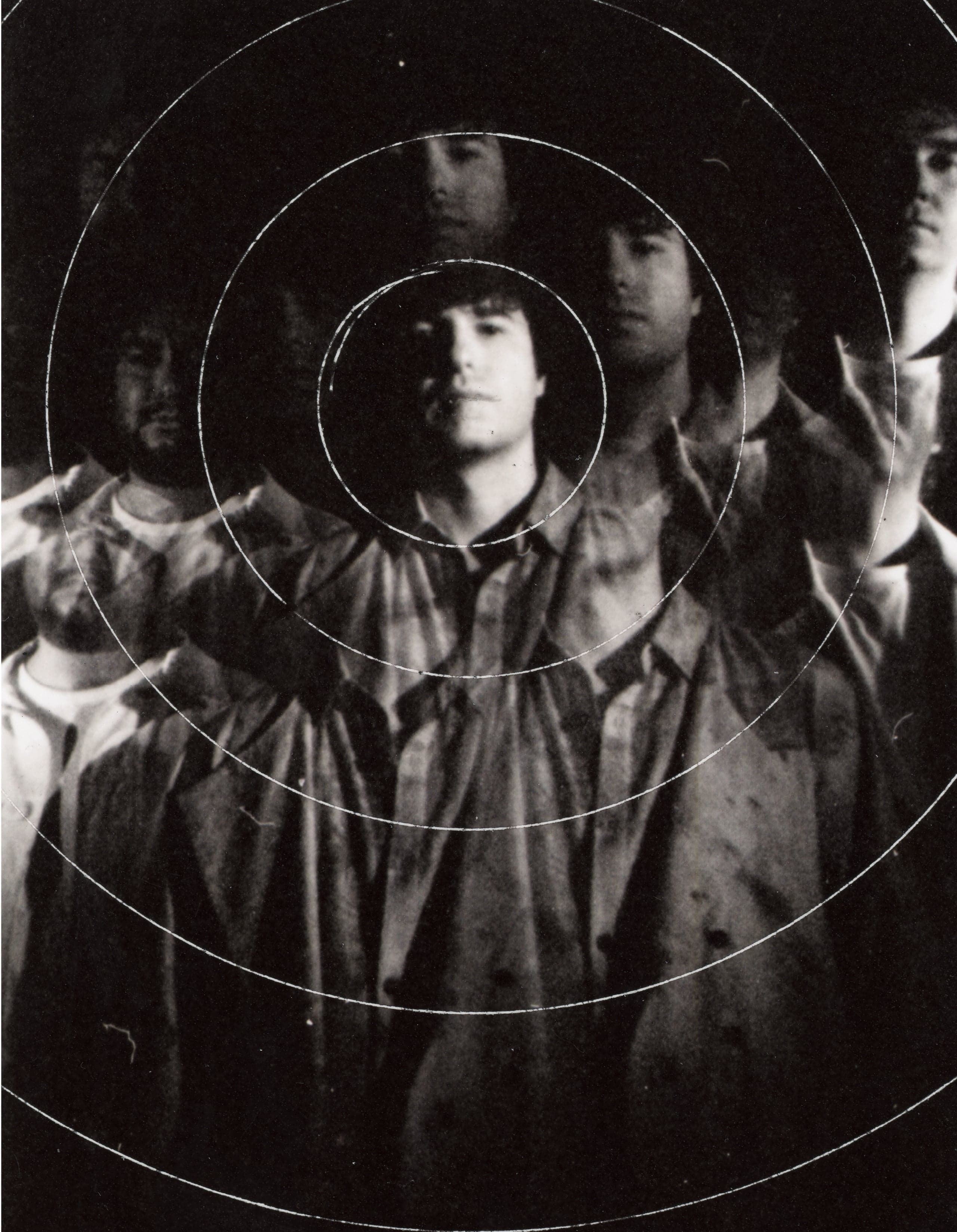
Nessa: Yeah, and social media is a big one now for bands.
Luke: You’ve got to embrace social media without losing your core values and DNA, and you know, we quite enjoy social media. There are obviously serious aspects to it, but we’re playful with it and it can be a great way to connect with people quickly and easily. As you said, there were people who probably weren’t alive when we put out our first album, and now we can get to them. We have to be careful with how we operate it because we are a bit older, but in regards to production techniques, it’s important to embrace the new, it keeps the songwriting fresh.
Alexis: It’s all there in the album, you can hear the desire to experiment and change throughout the timeline.
Nessa: Do you have a desire to go back to the heyday at all — or are you happy with all the advances we have right now?
Alexis: It wasn’t something that’s all then and isn’t now. You can’t forget that the main thing is the music, but it obviously comes with a certain lifestyle.
Luke: Well that’s the thing, nothing’s off the table now. I love it. Stylistically, musically, I think we’re living in a very free time. When we started out, there was a lot of pressure on not doing the wrong thing, you had to be indie and not ‘that’ at all. But what I love about the modern way of things is that you’re free to be creative, without people immediately tearing you down. The democratisation of everything in the music world is really cool. It’s not just about the top 40 anymore. When we came out it was a band’s world, and it’s not so much anymore. But I do really hope we see more independent bands getting signed to major labels.
Alexis: Those bands aren’t so much in the forefront commercially as they were back then maybe, but there’s still a lot of great music being created in this day and age. It’s just that you have to dig a little deeper sometimes. It’s a bit more word of mouth, which is exciting as well.
Nessa: Another label that you guys have been tangentially associated with is landfill indie. How do you feel about that?
Luke: Love it. Embrace that shit. It’s great. But I don’t think we would think of ourselves as a landfill indie band. Wrongly or rightly, one thing about the Kooks is we’ve always felt quite on our own, and we never quite fit in with any one genre or scene. We were always too poppy for the indie kids or too indie for the pop kids. But I’m cool with it. I will hear the hat.
Hugh: It was so oversaturated at the time, there were bands that labels would just throw money at. You could go out in Camden and watch an indie band every night. To me, the landfill thing implies a band that has been dead and buried, but I think we’ve managed to survive [laughs].
Luke: Isn’t Murph [Matthew Murphy] from the Wombats doing something with landfill indie? We should get involved.
Nessa: You should own it and make merch, or maybe your own landfill indie festival.
Luke: This is what I’m talking about, owning it. It’s almost time for the reunion tour, isn’t it?
Nessa: You guys have known each other for such a long time. What has witnessing each other’s growth been like?
Alexis: I feel like we’ve all settled into a state of zen. When I joined, the band had been through a lot of lineup changes and it was quite chaotic. But throughout the years, as things have solidified a bit more, we’ve all settled as people and as a band, and it just feels like a real sense of unity. It’s so encouraging because you need to be able to trust each other.
Nessa: Who would you say has seen the most growth out of all of you?
Hugh: I was 15 when we signed so I probably did the most visible growing up from a child. I was a child star darling!
Luke: Hugh’s growth has been incredible, 100%. Hugh’s been on this journey of learning to score, and he can pick up any instrument. He’s a complete bastard. I mean, we were like in the middle of America or somewhere and he picks up an accordion and just plays it. You’ve got on quite a journey actually, it’s crazy. Growing up while on tour… There were places where you weren’t allowed a wristband to drink in the venue.
Hugh: It was totally socially tough. I was surrounded by these glamorous happenings, and people who were three or four years older me. That’s not a lot, but at the time it was huge. I felt like I wasn’t able to feel myself out before I had to be someone else on stage. But the love and support of Luke and later on Al has been enormous, and I do feel like we’re at a place which is so advanced and supported and intelligent. This is a relationship. It’s like a marriage.
Luke: We’ve had a lot of people inspire us and give us that push, and that’s how growth happens. Al, you wrote the first song you’ve had on a Kooks album on the new one, and that’s amazing. You’re really finding your feet in the writing space. It’s cool that everyone’s growing, and I guess I kind of stay like this, a constant [laughs].
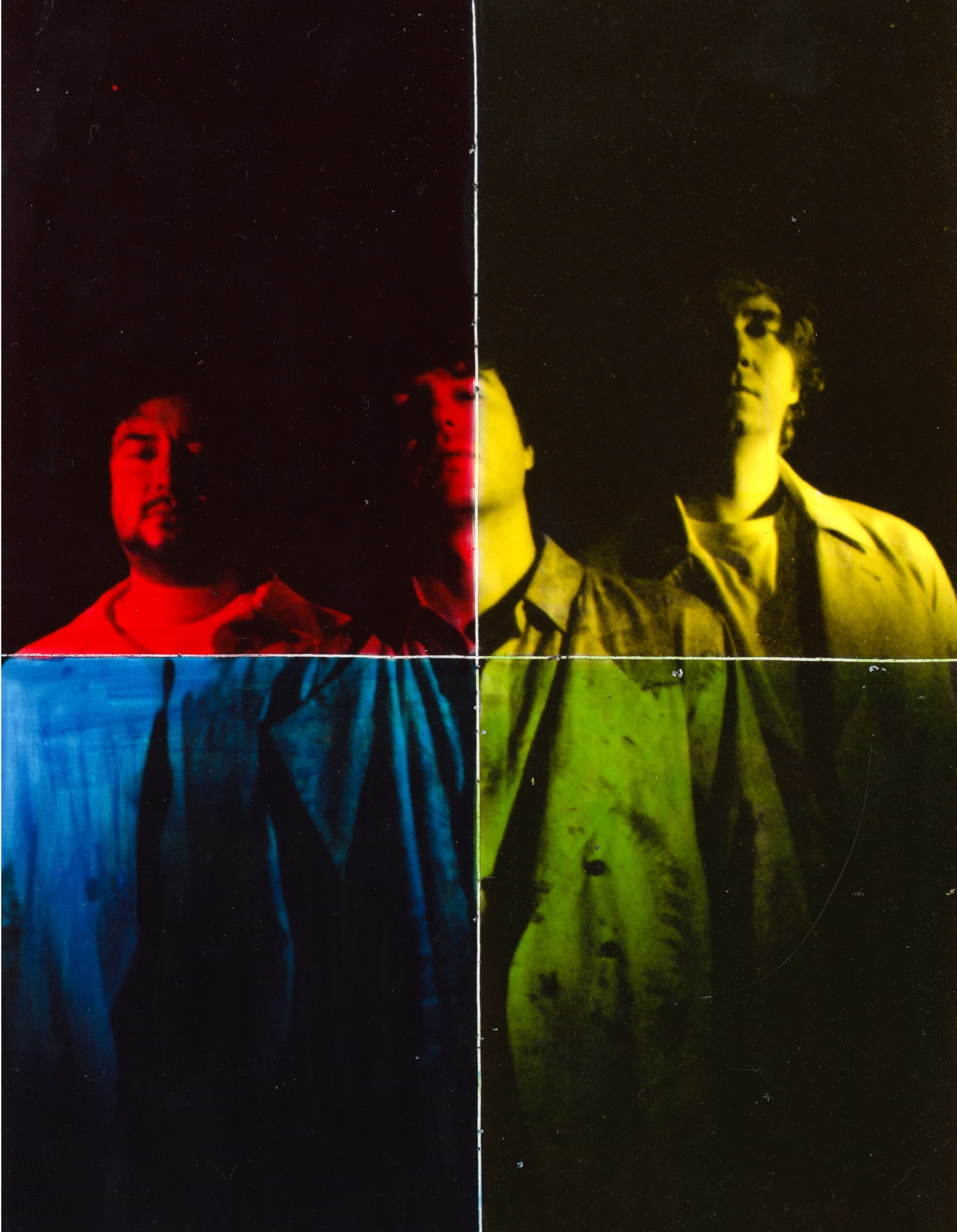
Nessa: Any conflicts?
Luke: We don’t do conflict. Management, we’ve got amazing management.
Hugh: I think about it all the time. When you find people that you’ve settled on, and have worked with for a long time, you notice that you’re going to the same place anyway — so all the disagreements are actually irrelevant. I remember this one instance that summed it up for me, I was with Luke at a train station, and we both wanted to get a coffee, and there was this big pillar with Pret behind it. I went one way and Luke went the other, and we were just observing each other, but ending up in the same place always. As a trio, we’re on the same page profoundly, and we perhaps occasionally choose different ways of getting there. That’s where arguments have happened that needn’t have. It’s part of growing up.
Nessa: Looking back more generally, you’ve been in an incredibly difficult industry for 18 years. What’s the biggest shift you can identify personally and musically?
Luke: Grey hairs.
Hugh: I think we take ourselves less seriously. It was a strange dynamic back then, there was a flagrant disregard for rules, regulations, and creative laws in some cases, but at the core of it, we wanted to be a serious band that was taken seriously. We came out guns blazing because there was this press angle that wasn’t really representing how we felt at the time, and we were defensive and inflexible in regards to that idea of us being a serious, credible act. Now, that’s slightly unwound itself.
Luke: What we do is really credible because now you look at that first record and you’re like how can that not be?! There’s nothing non-credible about that, and you’re right, we felt really defensive about those things. That weight has gone. Things have changed. It goes back to the democratisation of thighs, it’s a cool time, especially to be in The Kooks.
Nessa: Do you feel the need to separate from your past in some way – and away from the bangers? You pretty much have to play ‘Naive’ and ‘Jackie Big Tits’ every single time. Is there a sense of almost, I guess, becoming somewhat resentful?
Luke: Ooh, that’s the age-old battle.
Hugh: Only because there are so many songs from that first record, but for some reason, ‘Naive’ is always referenced. This is not a one-hit wonder project, but sometimes it feels like it is. And then sometimes it does feel like a one-hit wonder project, but a lot of one-hit wonders within the project. Luke always says before we finish with Naive, “I think you can guess what it is “, and to me, that implies that that is why people are here, but when you look at the show, there’s this enormous eruption of singing throughout every song, so I think we’re very blessed to have such a hit, but there’s also so many good songs that aren’t far behind Naive in the numbers.
Alexis: And throughout the years, we’ve managed to include the new music in the set in a way that’s quite natural, so there’s this revolving playlist of bangers. It feels like the crowd has been so receptive to the new music as well.
Hugh: Live wise, there was a shift. We did have a dip, there were some awkward festivals and awkward gigs and some awkward responses from all corners of the music business. But we made it through that and now we feel like we’re part of the woodwork, and ingrained in people’s experiences and reverie.
Luke: Definitely in the past, we were always running from stuff and thinking about the future, but now we’re at that point where we’re quite proud and cool with it all. Now, it’s almost building on what we’ve got. There used to be so much more pressure. There are a couple of heartbreak moments when you’ve done the best thing you’ve ever done and you put it out and it doesn’t quite connect. But we’re grateful to have what we have, we’re a slow burn now. There’s a much more chill approach to it now. It’s just about making great fucking music, and doing what we want to do.
Nessa: What is your barometer of success for this album?
Luke: I’ll be happy with anything genuinely. That’s the only way to be really. I’m really happy with the music we make, and people who know, know. Over the pandemic, we confronted what we want in life, and number one is happiness. I don’t care if that’s cheesy. I don’t have time for feeling bitter anymore, life is too short.
Nessa: So in 10 years, you guys see yourself doing the same thing?
Luke: [laughs] just chilling making music.
Hugh: Why not? It’s how we made it to 20 years?
Alexis: We’re still going to be making music. What an absolute privilege you know?
Luke: And you know we still feel like we have the best albums coming. That’s the most exciting thing.
Hugh: And then die, what else is there?
Luke: Maybe our kids will form a band? That would be exciting and not too far off.
Alexis: Or they could join the band in a few years?
What would be their sound? Would it be similar to yours?
Luke: You’d want them to respect what their fathers did, but you want them to be their own stuff so of course. I’m thinking jazz.
Nessa: What have you been playing Julian? Any Kooks songs?
Luke: I have, I have. He likes Jackie Big Tits, which is funny. It’s like a breastfeeding anthem now. But he loves female power pop. He loves Kim Petras and Kacey Musgraves, I’m not even joking. It puts him to sleep.
New EP Beautiful World – Echo in The Dark Part II’ is out now, listen here.
Watch the video for ‘Beautiful World’ with Milky Chance, here.
New album 10 Tracks to Echo In The Dark will be released July 22nd – pre-order here.
